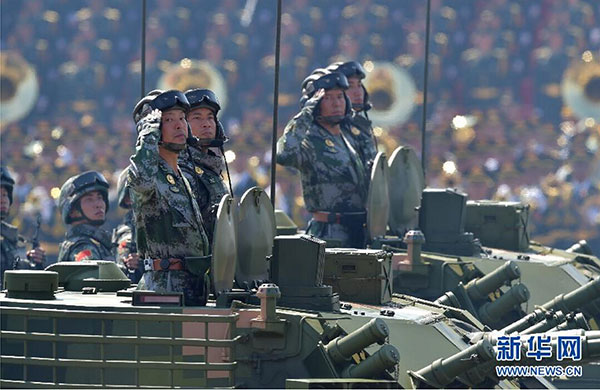Western media expose themselves by hyping China's defense budget
- By Wang Hui
 0 Comment(s)
0 Comment(s) Print
Print E-mail China Daily, March 10, 2017
E-mail China Daily, March 10, 2017
|
|
|
Major general Li Ming leads his formation during the military parade in Beijing, Sept 3, 2015. [Photo/Xinhua] |
Most of the reactions against the increase in China's military budget this year are nothing but clichés influenced by the "China threat" theory. Although some Western media outlets have mentioned in their reports that the 7 percent increase in China's military budget this year is the lowest in years, they still took a critical stand against China.
Their criticisms are largely centered on China's alleged lack of military transparency and ambiguous strategic intention. Some, quoting so-called Western experts, even went to the extent of speculating that there are hidden budget overlays.
In recent years, China's defense budget, compared with those of other countries, has drawn excessive attention from overseas, especially Western media outlets. Worse, such unusual interest has been coupled with wild speculations and suspicion, which cannot possibly help the outside world to properly analyze why China is forced to increase its military spending.
No one can deny that China's military budget is neither the largest nor the fastest growing in the world. Just days before China announced its annual defense budget, US President Donald Trump sought a 10 percent hike in the US' military spending. Strangely, some Western media reports mentioned the US figure while highlighting China's defense budget, without questioning the US' strategic intention of having a defense budget which is three times bigger than China's.
Such a bias against China is deplorable. As a country that has to defend its interests both at home and abroad, China is justified in spending a moderate percentage of its GDP to modernize its military. The growth rate of China's military budget has kept pace with its comprehensive national strength and has been compatible with its GDP growth. This year, China's GDP is projected to grow at 6.5 percent and its defense budget has been raised by 7 percent.
In terms of per capita military spending, an important index to gauge a country's defense budget, China's is minimal: it is one-eighteenth that of the United States, one-ninth of Britain, one-fourth of Japan, one-seventh of France and one-fifth of Russia. In contrast, China has the largest population in the world and a territory of about 9.6 million square kilometers to defend. And China has jurisdiction over waters of about 3 million square kilometers. With Chinese interests growing rapidly overseas, the military is also counted on to safeguard the safety of Chinese personnel and properties overseas.
Compared with other big countries, China faces more challenges, even threats, in its neighborhood. For example, on Monday, the Democratic People's Republic of Korea test-fired four ballistic missiles, after testing a new type of Pukguksong-2 ballistic missile on Feb 12. And on Monday night, two mobile launchers and many of the equipment needed for deploying the US' Terminal High Altitude Area Defense anti-missile system reached the Republic of Korea. Which is shocking because both the US and the ROK know that the move will raise tensions on the already tense Korean Peninsula and worsen China's security environment.
The decision of Washington and Seoul to deploy the THAAD system will only aggravate tensions and pose a direct threat to China's security. Besides, countries like Japan and Vietnam have repeatedly encroached upon China's maritime interests in the East and South China seas in recent years. And the US regularly sends its aircraft carriers and warships to patrol the disputed waters in the South China Sea under the pretext of defending the "freedom of navigation".
Any country facing challenges similar to those faced by China will need to build up a stronger military so that it can respond timely and effectively to possible conflicts instigated by irresponsible neighbors or the only superpower.
Those who rack their brains to find faults with China for its defense budget are barking up the wrong tree. Instead, they should expose the intentions of the countries that have wittingly or otherwise worsened China's security environment.
The author is a senior writer with China Daily.






